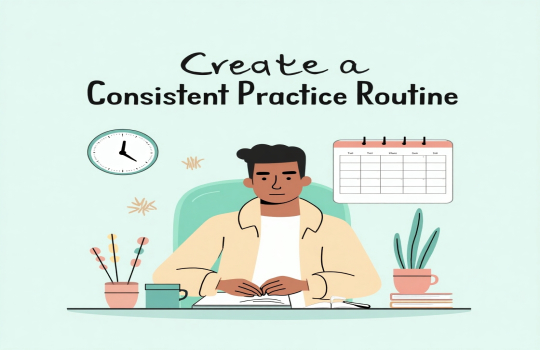Studying is an essential skill that affects every stage of life—from early schooling to professional development and even personal hobbies. Yet, many people struggle because they don’t have a strategy tailored to their needs. The truth is that studying effectively is not about spending the most hours at a desk but about studying smart, using structured methods, and adapting to the situation.
In this article, we’ll dive deep into study tips for different groups of learners, various scenarios, and purposes. We’ll also introduce modern tools like Oreate AI to help boost your efficiency.
To know Oreate AI, further read: Oreate AI: Everything You Need to Know
Quick Reference:
- Study Tips for College Students
- Study Tips for High School Students
- Study Tips for Postgraduate Students
- Study Tips for Exam Preparation
- Study Tips for Self-Improvement
- Study Tips for Hobby or Interest Development
- Study Tips to Improve Learning Efficiency
- Study Tips to Improve Grades
Study Tips for Different Groups
Different learners face different challenges. College students often have to juggle academic pressure with internships and social life, while high school students are learning how to study independently for the first time. Postgraduate students face the challenge of managing complex research projects.
Study Tips for College Students
1. Manage Your Time with a Detailed Schedule
(Click the picture to try Oreate AI Toolkit ⬆️)
Time management is one of the biggest challenges for college students because of multiple overlapping responsibilities such as lectures, assignments, group projects, and part-time work. A good strategy is to plan your week in advance, breaking each day into smaller blocks of time for specific tasks.
For example, dedicate Monday mornings to revising lecture notes, reserve afternoons for lab reports, and set aside evenings for reading or self-study. By allocating fixed slots, you avoid procrastination and reduce stress caused by last-minute cramming. Over time, this study tip trains your brain to be more disciplined and focused during each study block.
- Plan your weekly schedule every Sunday to stay organized.
- Use productivity apps like Google Calendar or Notion to set reminders and track tasks.
- Avoid overloading any single day by balancing study sessions with breaks and leisure.
2. Apply Active Recall and Spaced Repetition
(Click the picture to try Oreate AI Toolkit ⬆️)
Instead of rereading notes passively, test yourself frequently on the material you’ve studied. Active recall forces your brain to retrieve information, which strengthens long-term memory and makes knowledge easier to recall during exams. Pair this with spaced repetition—reviewing the same material at increasing intervals (e.g., 1 day, 3 days, 7 days)—to avoid the “forgetting curve.”
Apps like Anki or Quizlet can help automate this process, but you can also create simple flashcards with questions on one side and answers on the other.
- Use flashcards or self-made quizzes for challenging topics.
- Schedule reviews in short but regular intervals rather than marathon study sessions.
- Focus on explaining answers aloud to reinforce understanding.
3. Leverage the Power of Study Groups
Study groups are a great way to learn from your peers, clarify doubts, and test your understanding by explaining concepts to others. When you teach a topic to someone else, you are forced to break it down into simple terms, which solidifies your own comprehension.
However, study groups should not turn into social gatherings, so it’s important to set a clear agenda for each session. For example, assign topics to each member in advance and hold a quick Q&A session at the end. A productive study group can also help divide research tasks, create summaries, and share insights from multiple perspectives.
- Keep group sizes small (3–5 members) to maintain focus.
- Assign specific topics to each member and rotate the teaching role.
- Set a time limit for each meeting to prevent distractions.
4. Use Campus Resources and Online Tools
Most colleges offer free academic support services, but many students fail to take advantage of them. The writing center can review your essays and provide guidance on improving your argument structure and grammar. Similarly, library staff can help you navigate research databases like JSTOR or ScienceDirect, saving you time on finding credible sources.
If you’re struggling with a subject, you can attend free tutoring sessions or join online discussion forums. Combining these resources with modern digital tools makes a perfect tip for studying, ensuring that you’re studying smarter, not harder.
- Visit your campus writing center for essay feedback.
- Use digital library databases for research and referencing.
- Explore online communities or workshops for additional guidance.
Study Tips for High School Students
1. Create a Distraction-Free Study Environment

High school students often find it hard to stay focused because of constant digital distractions like social media, notifications, and games. The first step toward effective studying is to build a clean, quiet, and distraction-free space.
Keep your phone on silent mode or use focus apps that block distracting websites during study hours. A well-lit desk, comfortable chair, and organized materials can improve concentration and reduce unnecessary stress. By following this study tip, your brain begins to associate the separated space with productivity and focus.
- Turn off phone notifications or use focus apps like Forest or Freedom.
- Keep only the materials you need (books, notes, pens) on your desk.
- Use background music or white noise if it helps you stay focused.
2. Master Structured Note-Taking
Taking notes is not just about copying what’s on the board—it’s about processing and organizing information so that it’s easier to review later. Techniques like the Cornell Method, outlining, or mind mapping help break complex topics into digestible chunks.
After class, rewrite your notes in your own words, adding examples or key insights. This extra tip strengthens understanding and prevents information from fading quickly. Using highlighters and colored pens for key terms also improves visual memory.
- Use the Cornell note-taking method or create mind maps for visual clarity.
- Rewrite class notes at home to reinforce retention.
- Use color-coding to differentiate between definitions, formulas, and examples.
3. Break Large Tasks into Smaller Goals

A common mistake among high school students is trying to tackle a massive assignment or chapter in one sitting. Instead, break it down into smaller, manageable goals that can be accomplished in short study sessions.
For instance, if you need to study a 50-page history chapter, divide it into five 10-page segments, reviewing one segment each day. Smaller goals provide a sense of achievement and keep your motivation levels high. This motivation study tip also reduces procrastination because smaller tasks feel less overwhelming.
- Create a checklist of small, specific tasks for each subject.
- Reward yourself after completing each mini-goal to stay motivated.
- Alternate between subjects to avoid burnout and keep studying fresh.
4. Review Material Every Day
Instead of cramming all your study sessions into the weekend, dedicate 15–30 minutes each day to reviewing what you learned in class. Daily reviews keep the material fresh in your mind and help transfer information from short-term memory to long-term memory.
For example, if you spend 10 minutes summarizing the main points of your science lesson, you’ll retain more information during exams. Even a quick glance at your notes before bedtime can make a significant difference in recall.
- Review notes for 15–30 minutes after school each day.
- Use quick flashcards or summaries for active revision.
- Highlight key terms and formulas for fast pre-exam reviews.
Study Tips for Postgraduate Students
1. Develop a Clear and Realistic Research Plan
(Click the picture to try Oreate AI Toolkit ⬆️)
Graduate studies require juggling multiple responsibilities, and having a well-structured research plan is essential for success. Begin by breaking down your long-term goals into smaller, manageable tasks with specific deadlines.
This motivational tip will help you stay organized and reduce the feeling of being overwhelmed. Make sure to revisit and adjust your plan regularly based on your progress and any new insights or challenges that arise. Using digital tools like calendars or project management apps can also help keep your workflow smooth and on track.
- Set weekly and monthly goals aligned with your overall research objectives.
- Prioritize tasks to focus on high-impact activities first.
- Schedule regular check-ins to evaluate progress and make adjustments.
- Use apps such as Trello, Notion, or Google Calendar to organize tasks.
2. Maintain Open and Frequent Communication with Your Supervisor
Your supervisor plays a crucial role in guiding your academic journey, so maintaining clear and consistent communication is vital. Regular meetings allow you to share updates, clarify doubts, and receive constructive feedback, preventing misunderstandings or wasted effort. Don’t hesitate to prepare questions or topics in advance to make the most of these sessions.
Besides your supervisor, engage with your peers and faculty members to broaden your perspective and find additional support networks.
- Schedule regular meetings and prepare discussion points ahead of time.
- Be open about challenges and seek advice early.
- Participate actively in seminars, workshops, and study groups.
- Build relationships with peers for collaboration and mutual support.
3. Master Efficient Reading and Note-Taking Strategies

Postgraduate studies involve processing a vast amount of academic literature, so developing effective reading habits is crucial. Focus on reading abstracts, introductions, and conclusions first to determine the relevance of papers before diving deeper.
Taking structured notes will improve retention and make future referencing easier. Experiment with different methods like mind maps, annotated PDFs, or summary tables to find what works best for you. Additionally, use reference management software to keep your sources organized and accessible.
- Skim for key ideas before detailed reading to save time.
- Use digital tools for annotation and note organization.
- Summarize important points in your own words for better understanding.
- Utilize software like Oreate AI Essay Writer, Zotero, Mendeley, or EndNote for citation management.
4. Prioritize Your Physical and Mental Well-being

The demands of postgraduate studies can be intense, making it easy to neglect your health, which ultimately hampers productivity and creativity. Establish a routine that balances work with adequate rest, nutrition, and physical activity. Taking regular breaks during study sessions helps maintain focus and prevents burnout, which can be one of the most effective tips for studying.
Moreover, engaging in hobbies or social activities outside academia is essential for mental rejuvenation. Remember, maintaining your well-being is not a luxury but a critical component of academic success.
- Aim for 7-8 hours of quality sleep each night.
- Incorporate regular exercise such as walking, yoga, or sports.
- Take short breaks every hour during study to refresh your mind.
- Allocate time for hobbies, socializing, and relaxation.
Study Tips for Different Scenarios
Study Tips for Exam Preparation
1. Create a Structured Study Schedule
(Click the picture to try Oreate AI Toolkit ⬆️)
Effective exam preparation begins with a well-organized study timetable. Break down your syllabus into manageable sections and allocate specific time slots for each topic based on its difficulty and importance. Planning ahead reduces last-minute cramming and helps you maintain a consistent study rhythm.
Remember to include short breaks to avoid burnout and keep your mind fresh. A visual timetable can also motivate you by clearly showing your progress as you complete each study session.
- Divide your syllabus into daily or weekly study goals.
- Prioritize challenging topics and revisit them frequently.
- Use tools like planners or digital calendars to track your schedule.
- Schedule regular breaks to maintain focus and prevent fatigue.
2. Use Active Learning Techniques
Passive reading is often ineffective for exams, so engage actively with the material to deepen your understanding and retention. Techniques like summarizing concepts in your own words, teaching the content to someone else, or creating flashcards can significantly improve memory.
Practice answering past exam questions or paraphrasing new concepts with Oreate AI Paraphraser under timed conditions to familiarize yourself with the format and improve time management. This useful learning tip not only helps you grasp the material but also builds confidence for exam day.
- Summarize key points aloud or in writing.
- Teach concepts to peers or yourself to reinforce understanding.
- Create and review flashcards regularly.
- Practice with previous exam papers under timed conditions.
Study Tips for Self-Improvement
1. Set Specific and Measurable Goals

Self-improvement begins with clearly defining what you want to achieve. Instead of vague objectives like “study more,” set specific, measurable goals such as “complete three chapters of my textbook each week” or “write a 500-word essay every weekend.” Clear goals provide direction and motivation, helping you track your progress and celebrate milestones. Revisiting and adjusting your goals regularly ensures they remain relevant and challenging, keeping you engaged in continuous growth.
- Define precise targets with deadlines.
- Break big goals into smaller, achievable steps.
- Monitor your progress weekly or monthly.
- Adjust goals based on your performance and changing priorities.
2. Cultivate a Growth Mindset
Adopting a growth mindset means believing that your abilities and intelligence can improve through effort and learning. This attitude encourages resilience and persistence, helping you embrace challenges as opportunities rather than obstacles. When encountering setbacks again, view them as valuable feedback instead of failure. Practicing self-reflection and focusing on the learning process rather than just results can greatly enhance your motivation and long-term development.
- Embrace challenges as chances to learn and grow.
- Reflect regularly on your learning experiences.
- Celebrate effort and progress, not just outcomes.
- Replace negative self-talk with positive affirmations.
3. Develop Consistent Learning Habits

Consistency is key to self-improvement. Instead of relying on occasional bursts of motivation, build daily or weekly routines that incorporate study or skill-building activities. Creating habits reduces the mental effort required to start tasks and makes learning a natural part of your lifestyle. Start small to avoid burnout—studying for just 20-30 minutes a day can be more effective than irregular, long sessions. Over time, these consistent efforts compound into significant progress, evolving into a helpful learning habit.
- Establish regular study or practice times.
- Start with manageable sessions to build momentum.
- Use reminders or alarms to maintain routine.
- Track your habits to identify patterns and stay accountable.
4. Seek Feedback and Reflect Regularly
Constructive feedback is a powerful tool for self-improvement, providing insights you might overlook. Actively seek feedback from mentors, peers, or through self-assessment to understand your strengths and areas for growth. Combine this with regular reflection on your experiences, progress, and feelings to deepen your self-awareness. As one of the most effective learning tips for common students, reflection helps you make informed adjustments to your strategies, ensuring continual refinement and development.
- Ask for feedback from trusted sources frequently.
- Keep a journal to reflect on your learning journey.
- Analyze what works and what needs improvement.
- Use insights to set new goals and improve your methods.
Study Tips for Hobby or Interest Development
1. Set Realistic and Enjoyable Goals
When developing a hobby or interest, it’s important to set goals that are both achievable and fun. Unlike formal studies, hobbies should bring you joy and relaxation, so avoid overloading yourself with unrealistic expectations. Start with small, clear objectives like learning a basic skill or completing a beginner project. Achieving these milestones not only boosts motivation but also builds confidence to explore more complex challenges at your own pace.
- Define simple, achievable goals related to your hobby.
- Focus on enjoying the process rather than just the outcome.
- Celebrate small successes to stay motivated.
- Adjust your goals to keep them engaging and fun.
2. Create a Consistent Practice Routine
(Click the picture to try Oreate AI Toolkit ⬆️)
Consistency is key to improving any skill, including those related to hobbies. Setting aside regular time—whether daily or weekly—for practice helps you develop momentum and gradually improve. Even short, focused sessions are more effective than sporadic, lengthy ones. Try this universal study tip by integrating your hobby into your routine, and it will become a natural and rewarding part of your lifestyle rather than a sporadic effort.
- Schedule regular practice sessions that fit your lifestyle.
- Start with manageable time blocks to avoid burnout.
- Use reminders or alarms to maintain consistency.
- Track your progress to stay motivated and see improvement.
3. Learn from Multiple Sources
Expanding your knowledge through various resources can deepen your understanding and enhance your skills. Explore books, online tutorials, workshops, or community groups related to your hobby. Different perspectives and teaching styles can help you grasp concepts more fully and spark creativity. Engaging with a community, either online or in person, also offers valuable feedback and encouragement.
- Use diverse learning materials like videos, articles, all-in-one websites like Oreate AI and books.
- Join hobbyist forums, clubs, or social media groups.
- Attend workshops or classes when possible.
- Seek feedback and advice from experienced practitioners.
4. Embrace Experimentation and Patience
Hobby development is a journey that often involves trial and error. Don’t be afraid to experiment with different techniques, styles, or approaches—even if it means making mistakes. Patience is essential; progress can be gradual, and setbacks are natural parts of learning. Viewing challenges as opportunities to explore rather than obstacles will keep your enthusiasm alive and foster creativity.
- Try new methods and ideas without fear of failure.
- Give yourself permission to make mistakes and learn from them.
- Celebrate progress, no matter how small or slow.
- Practice patience and stay curious throughout the journey.
Study Tips for Different Purposes
Study Tips to Improve Learning Efficiency
1. Break Study Sessions into Focused Intervals (Pomodoro Technique)

Long, uninterrupted study periods can lead to fatigue and reduced concentration. Using focused intervals—like 25 minutes of study followed by a 5-minute break—helps maintain high levels of attention and prevents burnout. This well-known learning tip, known as the Pomodoro Technique, encourages sustained productivity while providing regular mental rest. Adjust session lengths based on your concentration span and gradually increase them as your stamina improves.
- Work in 25- to 30-minute focused blocks.
- Take short 5-minute breaks between sessions.
- Use timers or apps to keep track of intervals.
- After four sessions, take a longer break of 15-30 minutes.
2. Organize Information Visually
(Click the picture to try Oreate AI Presentation Maker ⬆️)
Visual tools such as mind maps, diagrams, and charts help structure information clearly and reveal relationships between concepts. Organizing material visually leverages the brain’s ability to process images, enhancing comprehension and recall. Creating your own visuals also reinforces learning by requiring you to synthesize and categorize information actively.
This study tip is especially useful for complex subjects with interconnected ideas. Use Oreate AI Presentation Maker to reorganize key information to help you memerize things quicker.
- Use mind maps to connect related topics.
- Draw flowcharts or diagrams to simplify processes.
- Highlight key points with colors or symbols.
- Combine visuals with concise notes for quick revision.
Study Tips to Improve Grades
1. Understand the Grading Criteria and Course Expectations
Improving your grades starts with a clear understanding of what your instructors expect. Carefully review the syllabus, grading rubrics, and assignment guidelines to know how your work will be evaluated. This insight helps you focus your efforts on the most important components and avoid wasting time on less impactful tasks. When in doubt, don’t hesitate to ask your professors or teaching assistants for clarification to ensure you meet or exceed requirements.
- Study the syllabus and grading rubrics thoroughly.
- Prioritize assignments and exams that carry more weight.
- Seek clarification on expectations and assessment criteria.
- Align your study efforts with the course objectives.
2. Manage Your Time and Avoid Procrastination

Time management is crucial to consistently achieving good grades. Break your study schedule into manageable chunks with clear deadlines to avoid last-minute stress. Use planners or digital tools to organize your workload and set reminders. Tackling difficult subjects early in your study sessions, when your energy is highest, improves efficiency. Combating procrastination by starting small tasks immediately helps maintain momentum, which is a great tip for high school students especially.
- Plan study sessions well in advance of deadlines.
- Prioritize challenging topics during peak focus times.
- Use apps or planners to track assignments and exams.
- Break tasks into smaller steps to make starting easier.
Frequently Asked Questions
Q1: What are the best study tips for exams?
The best exam tips include starting revision early, practicing past papers, and focusing on active recall. Pairing these with tools like Oreate AI PPT Maker for summaries can help.
Q2: How can I improve concentration?
Create a quiet study environment, remove distractions, and follow the Pomodoro technique. Sleep, exercise, and proper hydration also boost focus.
Q3: How can I study faster and better?
Active learning—such as teaching concepts to someone else or solving practice questions—is more effective than passive reading. Using AI tools like Oreate AI Essay Writer also speeds up writing tasks.
Q4: How many hours should I study daily?
The optimal time varies by person, but 3-4 focused hours with breaks are more productive than long, unfocused sessions.
Q5: How do I memorize things quickly?
Use mnemonics, visualization, and spaced repetition. Turning complex topics into stories or diagrams also improves recall.
Final Thoughts
Effective studying is not about how many hours you spend with a book but about how strategically you use your time and tools. Whether you’re a high school student, a college freshman, or a postgraduate researcher, these 25+ study tips will help you learn smarter, not harder. By combining traditional methods with modern AI-powered tools like Oreate AI Essay Writer, Paraphraser, and PPT Maker, you can save time, boost productivity, and focus on what truly matters—understanding and applying knowledge.









